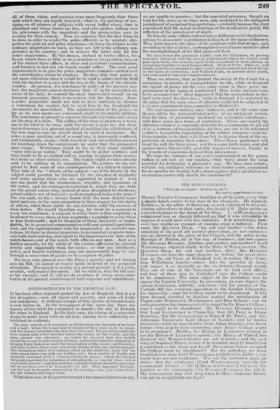INCONSISTENCIES IN THE CRIMINAL LAW.
IT has been often objected against the law of England, that it is a law of caprice,—now all rigour and severity, and anon all lenity and indulgence. A striking example of this species of inconsistency is now before its. In the newspapers of the same day, there are reports of two trials for conspiracy to murder, the one in Ireland, the other in England. In the Irish case, the charge of a concerted design to make away with an old lady, having been sufficiently es- tablished in evidence, The Jury retired, and remained in deliberation for upwards of an hour and a half ; when the Court sent to inquire if they were likely to agree, and the answer returned was, that they were not. The presiding authority then waited until a few minutes before the rising of the Court, and the same answer was returned; on which he directed that two bailiffs should be sworn to take charge of them, and he intimated his intention of keeping them locked up until the termination of the assizes, on Thursday, and then to have them conveyed to the liberty of the city and discharged. This intimation had a very salutary effect on the stubborn juror (for we understand there was only one holding out), for a verdict of Guilty was instantly returned, with a recommendation to mercy ; which the learned Sergeant expressed his intention of attending to, ax coming from such a respectable quarter ; and directed that sentence of death should be recorded, but 11w prisoners are to be transported fir life. They appeared through- out the trial to be quite unmoved by the passing scene, and retired from the bar without uttering a word.
What there was in the ca se to warrant a recommendation to mercy, we are unable to perceive ; but the convicted prisoners, though on trial for life, were, as we have seen, only sentenced to the mitigated punishment of perpetual transportation,—probably because the Jury considered that the actual destruction of life would alone justify the infliction of the punishment of death.
In this city some villains entered into a deliberate cold-blooded con- spiracy to assassinate a gentleman in Essex, of the name of BROWN. They went down to the place of his residence with that design, and, according to the evidence, contemplated several more murders after
the accomplishment of the first proposed deed. •
The Jury found the prisoners Guilty ; and the Chairman, in passing sentence, observed, that the utmost punishment which the Court could pass upon them, was scarcely equal to the magnitude of their offence in conspiring together to shed human blood. Richard Penis, Fillmore, and Smith, were then sentenced to three years' imprisonment and hard labour in the house of correction ; and Nkilliam feats, on account of his youth, was sentenced to one year's imprisonment.
Thus we observe, that in Ireland the mercy of the Court for a conspiracy to murder is transportation for life, while in England the rigour of justice for the very same crime is three years' im- prisomnent in the house of correction! How is the inconsistency to be accounted for? How happens it that the conspirators in Ire- land were tried for their lives, while in England it is regretted by the judge that the same class of offenders could not lie subjected to a severer punishment than committal to 13ridewell We can imagine nothing more ludicrous, and at the same time disgraceful to the jurisprudential poliq of an intelligent nation, than the idea of punishing hardened an systematic cutelhroats with three years in a house of correction. . These are exactly the offenders whom it is especially desirable for a community to get rid of by a sentence of transportation, for they are not to be reformed —that is beyond the expectation of the wildest visionary—and no thing remains to be done with them but to deprive them of the op- portunity of repeating their crimes. These Essex gentlemen will tread the mill for three years, and then come forth again, and plot against men's throats with prohably improved success, thanks to the lessons of experience derived front miscarriag,e.
We hope the sentence of one year's imprisonment on the young ruffian is not lost on our readers,—that being about the term
awarded for destroyine. W
a pheasant's egg. e have seen infants, without any indulgent reference to their tender years, committed for six months for stealing half a dozen apples; and a meditated as- sassination carries only double the punishment !


















 Previous page
Previous page